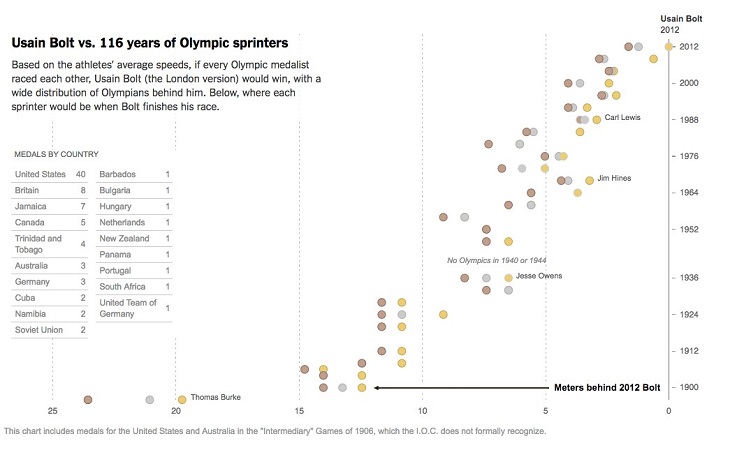Why are athletic world records always set? Are we getting better? Or is technology?
Many sport management professionals work with some of the greatest athletes in the world — people who are stronger and better at their sport than any other athlete before them. Others work to develop technologies and research that helps get athletics to a new level of endurance, strength, power or speed.
During the Olympics in 2012 or again in Rio 2016, you may have seen an infographics, such as the New York Times ones above, floating around of various 100m sprinters’ places in relation to Usain Bolt’s 2012 record. In sprinting terms, the disparities are huge. Which begs the question, is Bolt that much better of an athlete? Have athletes really gotten better? Faster? Stronger?
According to sports science reporter David Epstein, not exactly.
“Biomechanical analysis of the speed of Owens’ joints shows that had he been running on the same surface as Bolt, he wouldn’t have been 14 feet behind, he would have been within one stride… That’s the difference track surface technology has made, and it’s done it throughout the running world,” said Epstein in a TED talk.
Epstein notes various significant markers of technological shifts, as well as human understanding of nutrition, exercise physiology and training.
Here are a few examples Epstein gives from swimming:
• The flip turn in swimming introduced in 1956 made it so people didn’t have to stop and turn around at the end of a lane
• The introduction of gutters to the side of the pool allowed water to splash off and reduce drag
• Low-friction swimsuits
A few other examples include our understanding of body types, and specializations for specific sport. Our understanding of the human body’s physical limits has also broadened.
What will be the next great innovation in athletics?


